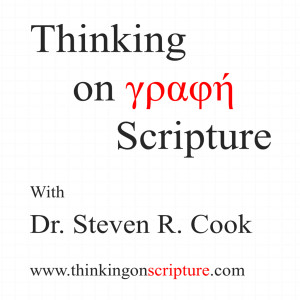
Thinking on Scripture with Dr. Steven R. Cook
Religion & Spirituality:Christianity

Author:
The author of the book is the prophet Malachi (Heb. מַלְאָכִי Malaki), whose name means my messenger (Mal 1:1).
Audience:
Malachi’s message was to Israel (Mal 1:1); specifically, a Judean audience familiar with temple activity (Mal 2:11).
Date of Ministry:
Malachi uses a Persian word for governor (פֶּחָה pechah – Mal 1:8), which implies Persian rule (538-333 B.C.). Furthermore, the temple was operational (Mal 1:6-11; 2:1-3; 3:1, 10), placing the writing after 516 B.C., as a post-exilic book. The religious and social problems addressed by Malachi seem to coincide with issues addressed by Ezra (Ezra chapters 9 & 10) and Nehemiah (Nehemiah chapters 10 & 13). It’s possible Malachi prophesied during the time when Nehemiah, Judah’s governor, was out of town for a few years (Neh 13:6, ca. 432 B.C.). If correct, Malachi’s ministry occurred nearly a hundred years after Haggai and Zechariah. Malachi is the last of the OT writing prophets.
Historical Background:
Malachi addressed some of the issues surrounding Israel’s neglect of the covenant; specifically, the promises the people had previously made under Nehemiah’s leadership to keep the Sabbath, fund the temple, offer proper sacrifices, and give tithes of food (Neh 10:28-39). When Nehemiah was present, the people obeyed. However, Nehemiah left for a period of time, maybe a few years, visiting Artaxerxes, king of Babylon (Neh 13:6); and during his absence the people fell back into sin, bringing unbelieving foreigners into the temple, not supporting the priests, failing to keep the Sabbath and marrying unbelieving foreign women (Neh 13:1-31). Malachi addresses similar issues.
- "The conditions described in the Book of Nehemiah are the very things Malachi deals with in his book: poor crops and a faltering economy (Mal. 3:11), intermarriage with the heathen (2:11), defilement of the priesthood (1:6ff), oppression of the poor (3:5), lack of support for the temple (vv. 8–10), and a general disdain of religion (v. 13ff). It was a low time spiritually for Judah, and they needed to hear the Word of God."[1]
- "Life was not easy for the returnees during the ministry of the fifth-century restoration prophets. The people continued to live under Gentile (Persian) sovereignty even though they were back in their own land. Harvests were poor, and locust plagues were a problem (3:11). Even after Ezra’s reforms and Nehemiah’s amazing success in motivating the Jews to rebuild Jerusalem’s wall, most of the people remained cold-hearted toward Yahweh. Priests and people were still not observing the Mosaic Law as commanded, as is clear from references in the book to sacrifices, tithes, and offerings (e.g., 1:6; 3:5). Foreign cultures had made deep inroads into the values and practices of God’s people. The Israelites still intermarried with Gentiles (2:11), and divorces were quite common (2:16). The spiritual, ethical, and moral tone of the nation was low."[2]
Malachi’s Message:
Malachi structures his message to address seven sins within the nation. In each of the sins mentioned, Malachi’s readers responded by asking, “How have we done that?” (Mal 1:2, 6, 2:13-14, 17; 3:7, 8, 13). The questions reveal their spiritual insensitivity to his charges. The priests were the major focus of Malachi’s message, as they had failed to teach and lead the nation in spiritual matters pertaining to temple sacrifices. “It is possible to attend the place of worship, to go through the motions of worship, and even to make sacrifices of worship, and still not worship God.”[3] Throughout, the Mosaic Law was the standard by which Israel’s behavior was measured, calling them back to obedience. Overall, Malachi’s message was that covenant faithfulness would restore the nation’s blessings.
Outline:
- God loves His people, Israel, and subdues her enemies (1:1-5).
- God rejects the corrupt worship that defiles His sanctuary (1:6-14).
- The priests failed to teach the Law to God’s people (2:1-9).
- Many Israelites had married unbelieving foreign wives and divorced the wives of their youth (2:10-16).
- God will send His messengers who will prepare the way for redemption and judgment (2:17-3:5).
- God’s people failed to support the priesthood with their tithes (3:6-12).
- A contrast between the wicked and the righteous, and a promise of a future leader who will restore the nation to God (3:13-18; 4:1-6).
[1] Warren W. Wiersbe, Be Amazed, “Be” Commentary Series (Wheaton, IL: Victor Books, 1996), 137.
[2] Tom Constable, Introduction to Malachi, Tom Constable’s Expository Notes on the Bible (Galaxie Software, 2003), NP.
[3] Ibid., NP.
More Episodes
 2019-11-09
2019-11-09
 68
68
 2019-11-08
2019-11-08
 49
49
 2019-11-06
2019-11-06
 60
60
 2019-11-03
2019-11-03
 48
48
 2019-11-02
2019-11-02
 40
40
 2019-10-06
2019-10-06
 58
58
 2019-10-05
2019-10-05
 55
55
 2019-09-14
2019-09-14
 59
59
 2019-09-14
2019-09-14
 52
52
 2019-09-07
2019-09-07
 67
67
 2019-09-07
2019-09-07
 69
69
 2019-09-01
2019-09-01
 94
94
 2019-08-25
2019-08-25
 75
75
 2019-08-17
2019-08-17
 67
67
 2019-08-17
2019-08-17
 56
56
 2019-08-11
2019-08-11
 52
52
 2019-08-10
2019-08-10
 71
71
 2019-08-10
2019-08-10
 49
49
 2019-08-03
2019-08-03
 62
62
Create your
podcast in
minutes
- Full-featured podcast site
- Unlimited storage and bandwidth
- Comprehensive podcast stats
- Distribute to Apple Podcasts, Spotify, and more
- Make money with your podcast
It is Free
- Privacy Policy
- Cookie Policy
- Terms of Use
- Consent Preferences
- Copyright © 2015-2024 Podbean.com





